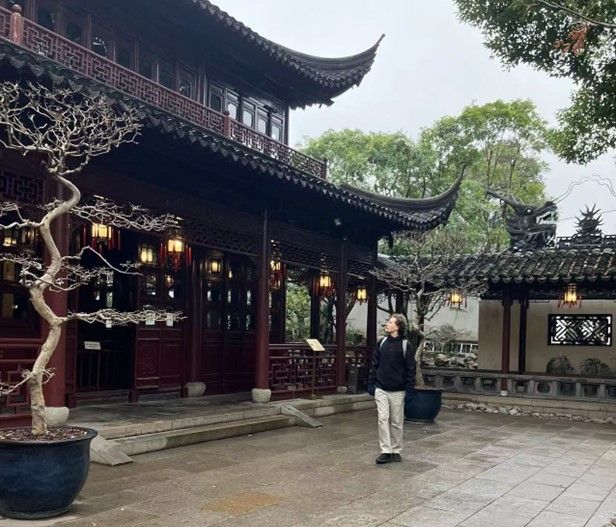CIEE China Spotlight: Meet Erik!
Erik is currently teaching in Chongqing, China! Read to learn more about his experience teaching English abroad and his life in China.
Why China? Have you been before?
I played glockenspiel in Palm Springs High School’s marching band when it toured Beijing and Taipei in 2014. My recent interest in China isn’t musical though. I started considering translation/interpretation as a career when I realized I wasn’t going to follow my master’s in philosophy with a doctorate, and of the more valuable languages to learn Mandarin felt most appealing to start with: it’s one of the biggest, it lacks grammatical gender, and it stems from one of the great cultures of world history. Plus, I studied Chinese philosophy in school and liked it.
Were you placed at a public or private school? What’s the difference?
I was placed at a public secondary school; public schools are more often called government schools in my experience. I haven’t worked at a private school in China, but common knowledge seems to be that private school work means smaller classes, higher pay, and longer hours. Private schools lack the prestige a top government school can have: some say every parent in my city dreams their child will study at my school one day, and I don’t think you’ll find a similar story about the private sector.
How are your classes? How many hours do you teach?
It's tough to teach as many classes a day as I do, but it's rewarding to get a feel for each one's personality and the diversity of the students within them over time. I teach 22 classes a week: each period lasts just 40 minutes though, so that comes out to 14.67 hours of weekly teaching time.
How long is your teaching contract?
My teaching contract is for one school year, but international affairs staff have asked if I have plans for the next one. My current thinking is that I’d like to teach here for two years before moving on. I can tell I’m no small investment on the part of my employer, so a one-and-done placement wouldn’t feel right.
Did getting TEFL certified prepare you for your role in China?
A top-shelf TEFL course will not only teach you to teach, but also prepare you for the host of cultural considerations to make when teaching abroad, covering a range of contexts. I recommend investing in one as I did.
Did you know any Chinese?
I’d studied Mandarin for more than a year before flying over (using Mango and Transparent, online courses my public library cards gave me access to), but it’s plain to me I’m still a beginner. I get compliments on my pronunciation, but I can’t hold a conversation. Even if I were fluent, I’d be fluent in Standard Chinese – and Chongqing not only harbors a regional accent, but a regional dialect as well. My reading ability isn’t fit for task either. The design of a Chinese character needn’t suggest its pronunciation or meaning, so I understand few of the signs in my city and none of the posted notices..
How are you dealing with the language barrier?
Thankfully, school staff can accompany me on complex errands like signing up for a cell line or bank account or making hospital visits. The translator on my phone can help when a so-so idea of what I’m looking at will do. And I keep learning Mandarin. Tuning into the talk of the town is far beyond me though, which means social life takes more trust.
What is the biggest culture shock when you moved to China?
The language barrier. See above question, ha! On another note, vegetarianism is a challenge in Chongqing, to the point that I’d say vegetarians hired to work here could use dietary training materials. I studied sustainability as an undergrad, and even I was surprised there are enough livestock in the world to make what I’ve seen possible.
What’s the coolest thing you’ve learned about Chinese culture?
Before arriving here, I thought Simplified Chinese would be the standard of writing on all media in mainland China, but not only am I finding examples of Traditional Chinese in my environment, I’ve even seen more ancient character sets like seal script cropping up. It’s a style choice, and I love that.
How’s your apartment? Is it close to your school?
My apartment is the best I’ve ever had. No, really – I have my own flat, complete with toilet, shower, fridge, washing machine, and even a kitchen. (No central heating though, so winters must be prepared for.) Campus starts about a block away; I can walk out the door 15 minutes before the bell if I want buffer time to fill my water bottle when I arrive. The elite status of my school has much to do with my fortunes I bet. It manages my building, despite it being off campus. You may not be so lucky if you’re heading to China, so mind what kind of employer is interviewing you and ask about the housing.
Did you find life to be affordable there? Are you able to save?
I am able to save, but not a ton – think in the neighborhood of 1,500 USD set aside at the start of my second semester. Life is totally affordable though. My rent and utilities are comped by the school, and they load my teacher card with a balance each month for meals at the canteen. On top of that, my income is healthy. There’s always enough in the bank for an emergency. Foreign teachers have enough worries, so I’m glad money isn’t one of mine.
How do you feel in China as an American?
The pizzeria putting on an English Corner every Wednesday is the only place where I interact with another American. I don’t seek Americans out: I grew up in a school district where most kids didn’t look like me anyway, and if I could expect to fit in with conationals I’d have little motivation to try work in another country. Nonetheless, one of the more prominent viewpoints among my students is a clear sense of national identity, so I can’t help that around them I’m America’s representative – a laden role burdened further by the shadow of US-China relations. You might like to know it’s common for folks in my circles to hope those relations turn more cooperative in the future.
Any advice for future teachers?
My advice is to prepare rigorously. Reading up on behavioral and legal expectations is a must. You should also factor in time to decompress after work (not quite leisure time in my experience) when envisioning your future schedule, as seeing 250 teens in a day is normal for me.
What’s It Like Teaching English Abroad? Check out CIEE’s Instagram to follow our current teachers abroad.
Related Posts
A Weekend in Shanghai—A Look Inside CIEE’s Weekend Retreat!
CIEE’s Weekend Retreat is one of the many benefits of the Teach in China programs! A weekend where teachers meet in Shanghai and have the chance to make friends and... keep reading
Happy Lunar New Year!
The 2024 Lunar New Year began on February 10th. Lunar New Year is also known as Spring Festival in China or Seollal in South Korea . This Lunar New Year... keep reading
Happy Holidays!!
The beginning of December did not start very well for me. I got a severe stomach bug that lasted for over two weeks, and I was homesick at the same... keep reading





